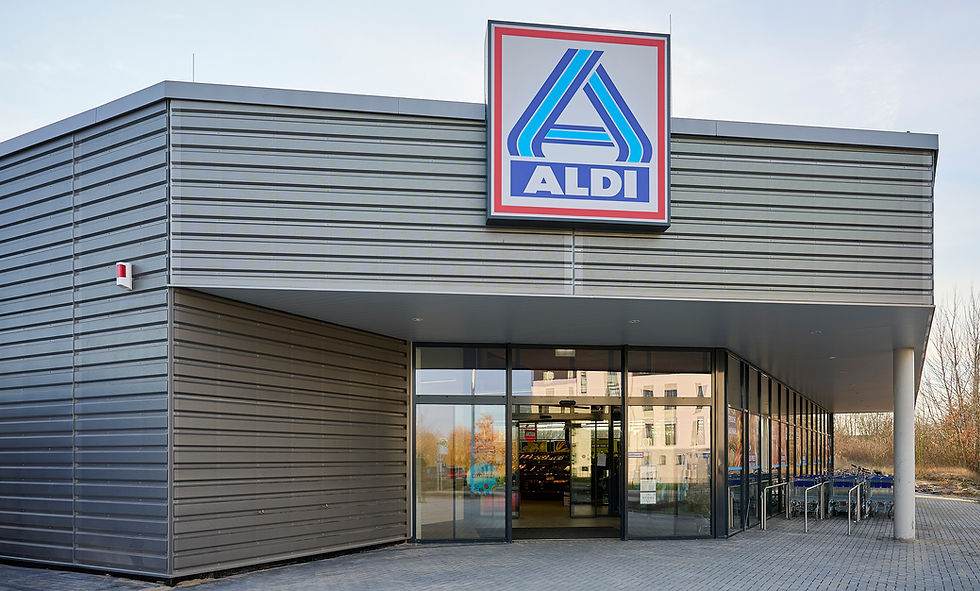Belgium: Aldi's road to 100% recyclability
- DRC Discount Retail Consulting GmbH

- Jun 17, 2021
- 3 min read
Discount Retail Chain ALDI Belgium and Luxembourg (German family owned) has sustainable packaging high on its agenda. “That starts with avoiding or reducing packaging where possible,” says Stefaan De Schepper, Corporate Social Responsibility Manager at ALDI Belgium and Luxembourg. “And where packaging is absolutely necessary, we go for 100% recyclable. We work closely with Fost Plus to ensure that our packaging can be integrated into the system as well as possible.”
In recent years, consumer awareness of packaging has increased significantly. The subject receives a lot of attention in the media and governments are increasingly strict about the packaging that comes onto the market. “Packaging is also high on the agenda in our own CSR policy,” says Stefaan De Schepper. “Today we have a 'dedicated' team that works full-time on the theme of sustainable packaging. This gives us the necessary space to develop our policy and realize great projects.”
Every gram counts
As a discounter, packaging reduction is in ALDI's DNA. “The drive for efficiency and optimization goes hand in hand with sustainability for us. Saving one gram of cardboard or plastics on an item with a large rotation has a major impact on the cost of the packaging at the end of the journey and therefore also on the item,” says Stefaan De Schepper. “So we are the last to add packaging when it is not strictly necessary.”
Aldi has also formulated concrete objectives for packaging reduction. By the end of 2024, the total weight of packaging for own products must be reduced by 10%. For some categories (such as fruit and vegetables), ALDI is going a step further and is looking to eliminate packaging altogether where possible. For example, the plastic bag around the organic fair trade bananas was replaced by a simple banderole last year, while more and more fruit and vegetables are offered in bulk unpackaged.
Facts and Emotions
Yet ALDI does not just go along with the demonization of packaging, and plastics in particular. “We don't let our choices depend on the perception that lives around a certain material. For us, the shelf life of products remains essential, because food loss almost always has a much greater environmental impact than that of the packaging, especially when it is recycled correctly. In many cases, plastics remains the most suitable material, sometimes even the only possible material. And when plastic packaging is 100% selectively collected and recycled, it is often one of the most sustainable solutions.”
The road to 100% recyclability
When packaging cannot be avoided, ALDI resolutely opts for recyclable materials. By the end of 2025, the company aims to achieve 100% recyclable packaging for all its own brand products throughout Europe. “In Belgium, we expect to achieve more than 99% by the end of next year. We closely follow the advice of Fost Plus. For example, when we examined our meat packaging, we decided to replace all black packaging, which are not recognized in the sorting centers, with transparent trays.”
ALDI also resolutely opts for recyclable packaging in other product groups such as snacking and fruit and vegetables. “Colored PET dishes are systematically replaced by the transparent variants that are more recyclable. So yes, the iconic blue mushroom tray will probably disappear from our shelves soon. We are currently running an extensive test project for this. In addition, we have also removed the last foam trays from our range. Sometimes we also look at specific products and packaging: for example, we switched the organic courgettes from a plastic flow pack to a banderole and we now opt for cardboard packaging instead of plastics for the Kanzi XS apples.”
The last stumbling blocks
Nevertheless, a number of stumbling blocks remain. “Composite and especially laminated packaging, which, for example, combine plastics with aluminum, are difficult to recycle. For a number of products such as animal feed, coffee or dairy, they remain essential for the time being. Through our contacts with Pack4Food and Fost Plus we notice that alternatives are on the way there too. The industry is clearly not standing still and we are convinced that we will also be able to close the cycle for that packaging in the coming years," concludes Stefaan De Schepper.
See here for more: https://www.fostplus.be/nl/over-fost-plus/nieuws/case-study-aldi-de-weg-naar-100-recycleerbaar?utm_medium=organic_social&utm_source=linkedin&utm_campaign=17/06





Comments